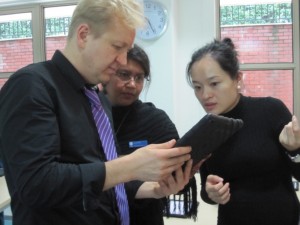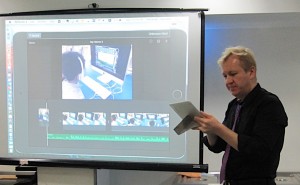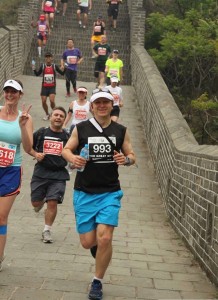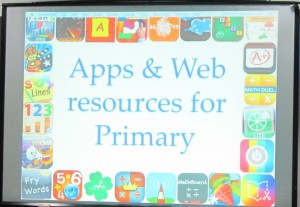Written by Roseline Yang (Community Relations Officer)
 Mr Alex was a Year 1 Co-Teacher for 5 years before moving to the position of Technology Intergrator for the past three and a half years. Let’s meet Mr Alexander Tabunets!
Mr Alex was a Year 1 Co-Teacher for 5 years before moving to the position of Technology Intergrator for the past three and a half years. Let’s meet Mr Alexander Tabunets!
Why do students call you Mr Minecraft, what does your role consist in?
I believe that children love Minecraft, this famous application that allow them to build anything they can dream of. Added to the fact that I lead one of Minecraft ASAs, I guess that built up this nickname for me! When children see me, they wave at me excitedly and shout “Mr…Minecraft”! (To be fair, I am not the only one doing Minecraft in our school).
My role consists of teaching technology (computers) to Year 1-2 and providing support to Year 3-4 in all aspects of technology. The aim is for teachers to be able to integrate technology in their teaching program. The use of technology is also integrated into the Year 5-6 curriculum.
One example of how technology was integrated into the curriculum was in Year 3’s Ancient Egypt unit. Children conducted online research about pyramids and temples of Ancient Egypt. They identified their characteristics and their use. Then, they sketched it and used Minecraft to recreate a pyramid. It was a very detailed project as they had to label the structure “Great Pyramid of Giza” and write a description with the dates it was built and it’s purpose.
I’m quite interested to know why you decided to specialize in ICT.
During my first year at YCIS, other class levels had a smartboard but not in Year 1 and I was wondering why as I thought it would be very beneficial for children to interact with knowledge in another dimension through touching and manipulating. The school’s leadership team aware of my thirst to try and use technology gave me, in my second year as Year 1 teacher, a smartboard in my class to experiment with. And that is how I fell in love with my second passion: Technology!
In less than 20 minutes, I created a literacy lesson using the smartboard. It was a matching phonics game that was making sound when the correct pair was connected. The children and I enjoyed it so much that I started to use the smartboard for all my other subjects: Science and Mathematics.
Oh, so you did not know anything about Technology before? Actually, what was your first passion? What was your specialty before teaching in YCIS?

I knew about technology but I did know much about educational technology and its impact on children and their learning. It was only after I saw how the smartboard could be used that I fell in love with experimenting with technology in the classroom. So I didn’t know much about educational technology before but I guess that my passion for programming is related to my first passion: Understanding the mechanisms of languages!
Actually, I am a linguist. My 1st degree was in English and teaching German. I taught for a few years in Primary and Secondary Schools after graduation and meanwhile, I was studying for my 2nd degree which was Japanese and Japanese Literature. After that, I also taught Japanese through instructions in English to Grade 6 students whose specialization was in French in an experimental school. But it was 15 years ago! Now I am studying for my Master’s of Science with specialisation in integrating technology into K-12 classroom program.
Wow! How many languages have you learnt? How many can you speak?
Oh, I learnt many but my main interest was to understand the system and mechanisms of a language, not to learn to speak. Once I had a taste of it, then I was not so interested in it anymore. Learning Chinese was the first language that pushed me to go to the country to develop it and besides culturally, I was very attracted by discovering Tibet, which is still one of my objectives!
So amazing! Do you have any other incredible things to share? Are you passionate about sports? Any championships like Mr Dave?
Well, not any national championships like Mr Dave, but I used to be the captain of a soccer team in High School. I also practiced different types of sports such as karate and athletics. Before coming to China 15 years ago, I used to do Power Lifting at a quite good level.
Actually, last time we were having lunch at the cafeteria, some colleagues were commenting on how you managed to lose 30 kg in just a year! Can you tell me more about this other incredible story of yours?
 When I arrived in China, my main focus was my work and learning Chinese and I stopped exercising, I put on a lot of weight. However, I was not ashamed of my new shape. I was just cozy and comfortable with being overweight for many years. That is how the majority of parents and teachers who were there some years ago knew me. Yet, in 2011 I started to have strong headaches and after consulting the doctor, I was told that my blood pressure was too high and that I would have to go under medication for life. I got so scared that I decided to take up running but unfortunately, I hurt my knee and I could not run anymore. So, I started to look for another way to solve my health problem to avoid going on medication. To make a long story short, that is how I found ETL (Eat to Live) plant-based diet recommended by numerous people including the person (Dr. Fuhrman) who had created it for himself, when diagnosed “never to figure-skate again because of his knee’s injury” www.drfuhrmann.com. I read his books, explaining how the food you eat impacts your health, and even changes your genes. The results were quite incredible: I started to lose 2 kg a week from 107kg, then it slowed down and after 5 or 6 weeks, I was losing 1 kg per week. And I lost it all without doing any sport! My blood pressure went to normal within three months. When I went to see the doctor, he could not believe that I had not taken his medications.
When I arrived in China, my main focus was my work and learning Chinese and I stopped exercising, I put on a lot of weight. However, I was not ashamed of my new shape. I was just cozy and comfortable with being overweight for many years. That is how the majority of parents and teachers who were there some years ago knew me. Yet, in 2011 I started to have strong headaches and after consulting the doctor, I was told that my blood pressure was too high and that I would have to go under medication for life. I got so scared that I decided to take up running but unfortunately, I hurt my knee and I could not run anymore. So, I started to look for another way to solve my health problem to avoid going on medication. To make a long story short, that is how I found ETL (Eat to Live) plant-based diet recommended by numerous people including the person (Dr. Fuhrman) who had created it for himself, when diagnosed “never to figure-skate again because of his knee’s injury” www.drfuhrmann.com. I read his books, explaining how the food you eat impacts your health, and even changes your genes. The results were quite incredible: I started to lose 2 kg a week from 107kg, then it slowed down and after 5 or 6 weeks, I was losing 1 kg per week. And I lost it all without doing any sport! My blood pressure went to normal within three months. When I went to see the doctor, he could not believe that I had not taken his medications.
So, all of this happened between April and September of 2011 (5 months) then I took up running again and in May of 2012, I ran my first Great Wall Half Marathon followed later by the full Great Wall Marathons.
Wow! Sorry, I’ve been side-tracked but your story is so interesting. Let’s go back to our main topic and finish this interview with this last question: what do you think of the impact that technology has on the children’s education?
The learning children do in school prepares them for the future, and for this reason it is important to incorporate technology in the classroom. Over the years, technology has evolved tremendously and will continue to do so. Those changes should be parallel with teachers’ lesson plans and learning techniques of the children.
 From my teaching experience, the difference is tremendous. Technology has a huge learning impact on the children. And this must be because technology makes learning so much more fun. A simple example: with an iPad application called Letter School, students can practice to trace and memorize numbers and letters which come with amazing visual and sound effects. I often used it in in Year 1 and many students improved their handwriting through the use of this app.
From my teaching experience, the difference is tremendous. Technology has a huge learning impact on the children. And this must be because technology makes learning so much more fun. A simple example: with an iPad application called Letter School, students can practice to trace and memorize numbers and letters which come with amazing visual and sound effects. I often used it in in Year 1 and many students improved their handwriting through the use of this app.
Another example with programming – K4 and Year 1 children use Bee-Bots, pre-programmable toys that help to understand the concept of directions. Then in Year 1 they start using Bee-Bots maps and Bee-Bot software which they review every year. Every year they get more challenging tasks to complete. Starting from Year 2 they begin learning Scratch programming – they create their version of a Bee-Bot, and write a simple code to make it move in different directions and create and add music loops. In Year 3 it gets more complicated – students create two or more characters and create a code to make these characters interact. This type of education helps children to learn the basic inner workings of computers. Children can feel successful at getting a computer to do what they tell it to do. It helps them to develop the ability to communicate their thoughts in a structured and logical way. Apart from this, different ways of coding and solving problems can inspire children to grow and become more creative. Coding is a kind of story-telling. You create your story and make it interactive. The skills that students develop through coding can set them up for success in written and oral communications in school. Also, Scratch is a great programming language to start with. If you understand how it works, it will be much easier to learn other programming languages. Programming is very logical and definitely changes your brain to be more efficient. So, starting early is definitely great for students!
Thank you so much for your time, Alex. It has been a tremendous pleasure to talk to you. Although you’ve always been very friendly, you seemed to be such a discreet person. There is always so much to learn from each other. Thank you for teaching me this lesson of humility and opening a window of curiosity for any individual. You never know one person until you really take the time to talk to him or her.